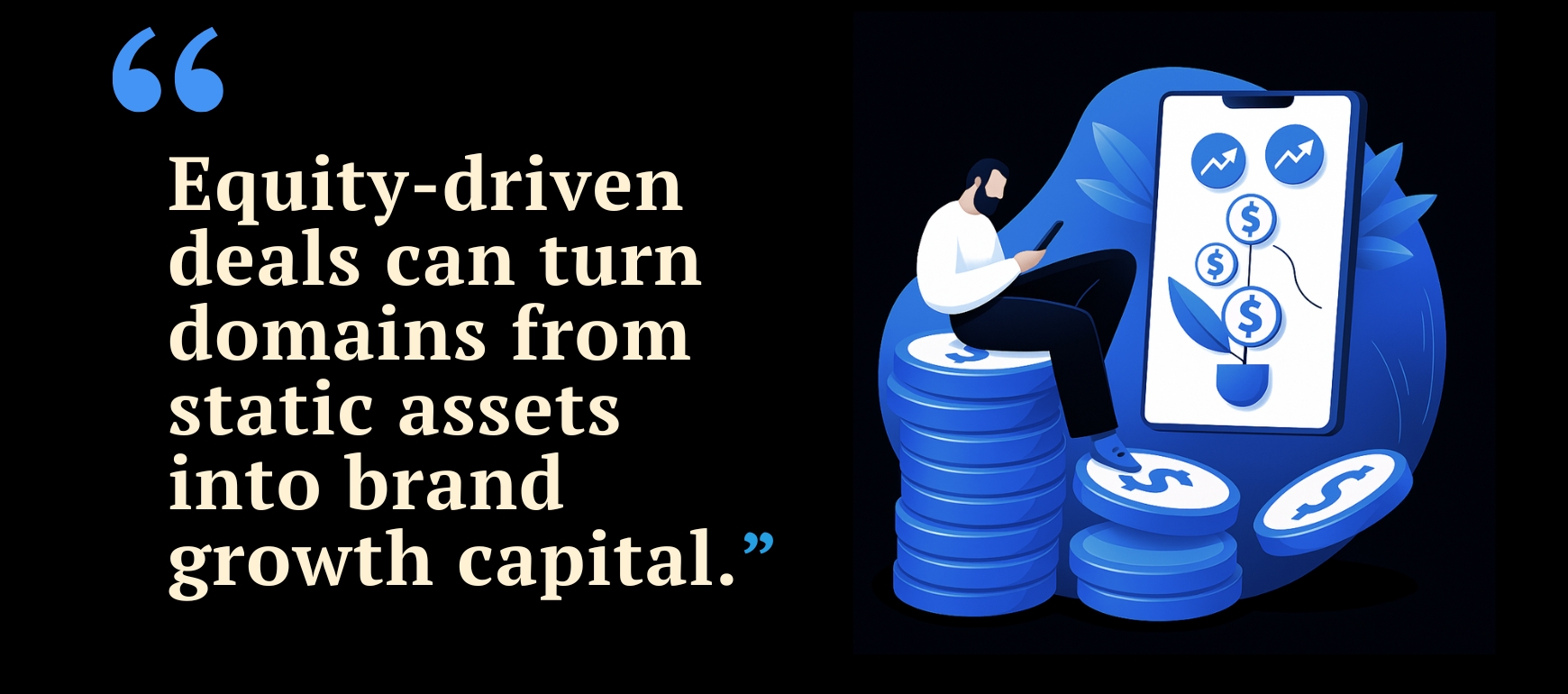Sports.com – Lottery.com’s Convertible‑Note Deal
Parties & structure: Public lottery platform Lottery.com announced in March 2021 that it would acquire the Strategic-Grade domain name Sports.com. SEC filings reveal that the company agreed to pay $6 million, half in cash and half via Series B convertible notes. The convertible notes had a zero‑percent coupon and were convertible into equity after the company’s SPAC merger. The initial payment of $3 million was due within six months of the merger; the remaining $3 million in notes converted to shares before October 2021. Lottery.com had previously purchased its own domain (Lottery.com) in 2017 using a $935,000 secured promissory note that could be converted into 465,170 shares, showing the company’s preference for equity‑based domain financing.
Lottery.com’s 2021 10‑K confirms that the Sports.com acquisition closed in December 2021 and notes that the company planned to explore sports‑gaming opportunities through the asset. The seller converted the Series B notes into shares following the SPAC deal.
Brand impact: Since obtaining Sports.com, the company has repositioned itself around sports media and gaming. A 2025 Nasdaq press release on Lottery.com’s planned Sports.com Super App says the company spent two years building Sports.com around soccer and motorsport, with the aim to launch a super‑app that integrates streaming, e‑commerce and gamification.
"This acquisition and the launch of the Sports.com Super App is the culmination of a precise strategy to consolidate fragmented sports experiences," said Mark Bircham, Director of Sports.com, in the statement.
The release notes that an existing platform supporting the super‑app already has over one million monthly active subscribers and that Lottery.com is funding the project through a $10 million transaction, payable in cash or stock, with a $15 million financing commitment, an indication that the domain asset has become a central pillar in its growth strategy.
Key lessons: Convertible‑note structures can align incentives: sellers receive upside through equity conversion, while buyers conserve cash. The Sports.com deal also shows that a Strategic-Grade domain name can support diversification into adjacent markets (sports media) and attract investors willing to fund complementary acquisitions.
In 2025, Sports.com formally launched an AI-powered platform with an integrated crypto exchange, expanding its reach beyond media into digital finance.
Chat.com – Cash + Equity Sale to OpenAI
Parties & structure: Serial entrepreneur and HubSpot co-founder Dharmesh Shah purchased Chat.com in 2023 for $15.5 million and later sold it to OpenAI. TechCrunch reported that Shah announced the sale on the HubSpot podcast in March 2024, confirming that OpenAI was the buyer and hinting he was compensated partly in shares. In an Economic Times recap, Shah explained via X that he had known OpenAI CEO Sam Altman for a decade, didn’t like profiting off friends and “always wanted to own OpenAI shares”, implying a cash plus stock arrangement. He also described Chat.com as a “brilliant domain that will inspire someone else to build a product,” signalling that selling to OpenAI aligned with his vision.
Brand impact: OpenAI integrated Chat.com into its ecosystem as a gateway to ChatGPT and other AI products. The acquisition gave OpenAI an intuitive, generic keyword domain that captures “chat,” reinforcing brand dominance. For Shah, the transaction allowed him to exchange his asset for equity in one of the most valuable AI companies, aligning with his long‑term investment strategy. While financial details remain private, reports suggest the sale may have exceeded his $15.5 million purchase price and that the equity component was significant.
Key lessons: High‑profile founders often use cash plus equity deals when selling Strategic-Grade domain names to trusted partners. Accepting equity can turn a one‑time sale into a long‑term investment in the buyer’s success, but it requires confidence in the counterparty. The Chat.com example also shows that generic keyword domains can command eight‑figure valuations and attract strategic acquirers when the domain aligns with core product functionality.
Candy.com - $3M + 5% equity
Parties & structure: In 2009, domain investor Rick Schwartz sold Candy.com to the founders behind what later became GreenRabbit for $3 million plus an equity kicker. Schwartz has written that the agreement started as “$3 Million and I also got 5% of the company,” and that subsequent restructurings increased his stake over time.
When GreenRabbit was eventually sold (to Performance Food Group), Schwartz says he collected ~$6.8 million from his equity stake, contributing to a total realization (cash + equity) “in excess of $11 Million”|.
Brand impact: Schwartz describes that his domain sale and ongoing equity stake powered the acquiring company’s branding leverage.
“They used Candy.com as a booster rocket. They used the domain to elbow their way right into the center of the candy industry.” Rick Schwartz blog post
In his narrative, the domain helped the company transition from a small startup to an established brand, ultimately leading to the acquisition by a Fortune 500 food distributor.
Key lessons: A cash + equity structure can transform a seven-figure domain sale into an eight-figure outcome when the operating company grows and exits. A powerful domain like Candy.com can serve as a strategic brand lever that accelerates value beyond the domain itself, especially under aligned ownership.
Mint.com - equity for domain
Parties & structure: According to DomainNameWire, Hite Capital (the prior domain owner) received Series A stock in exchange for transferring the Mint.com domain.
Mint gave a ‘substantial’ amount of Series A stock to Hite Capital in exchange for the Mint.com domain name. That stock was worth a ‘couple of million dollars,’ says one source says a TechCrunch source. The report notes that it is “not clear if there was cash involved in the transaction as well.”
Brand impact: Mint, built on Mint.com, grew to become a major fintech brand and was acquired by Intuit in 2009 for $170 million. Securing the exact-match domain contributed to Mint’s brand credibility, marketing leverage, and valuation.
Key lessons: For early-stage startups, equity for a Strategic-Grade domain name can be both feasible and founder-friendly when cash is tight. For sellers, the upside is real, as long as the deal is papered with appropriate protections against dilution and there’s a plausible exit path. The Mint example shows how a domain-for-equity trade can convert into multi-million-dollar value at acquisition.
Brew.com - cash + undisclosed equity
Parties & structure: In 2018, domain investor Michael Cyger sold Brew.com in a cash + equity arrangement with a beverage startup. DNJournal reports:
“Michael Cyger sold Brew.com under a cash-plus-equity deal … he expects the equity stake … will end up being worth seven figures.”
Brand impact: The one-word domain simplified marketing, strengthened trust with distributors and investors, and positioned the brand as a scalable platform for future product lines. Its clarity and authority turned the name itself into a business asset that supported valuation and capital access.
Key lessons: Brew.com shows that combining cash and equity aligns incentives and preserves capital. The seller participates in future growth, while the buyer secures a strategic asset without depleting funds. Clear valuation, anti dilution clauses, and defined exit terms turn a domain sale into an investment position linked to brand performance.
Synthesis: Nine Strategic Lessons in Equity-Fueled Brand Growth
| Lesson | Strategic insight | Practical takeaway |
|---|---|---|
| 1. Equity alignment preserves liquidity for growth | Equity or mixed cash-and-stock structures fund brand expansion without straining capital. | Use equity tranches or convertible notes to secure brand assets while allocating cash to marketing and scale. |
| 2. Incentive alignment sustains brand performance | Sellers with equity stakes stay invested in product and brand performance. | Link share conversion or vesting to measurable brand milestones or exit events. |
| 3. Equity models expand access to growth assets | Cash-plus-equity structures let early companies acquire domains that accelerate visibility and trust. | Blend a defined cash base with stock or convertibles tied to future financing or valuation events. |
| 4. Timing drives market signal | Aligning a domain acquisition with funding or product launches multiplies market attention and investor confidence. | Coordinate rebrands or upgrades with capital raises or media cycles to amplify valuation impact. |
| 5. Brand trust compounds enterprise value | Strategic-Grade domain names strengthen investor perception and customer conversion. | Treat the domain as a growth asset, an intangible that underpins IR narratives and acquisition value. |
| 6. Seller diligence underpins growth outcomes | Equity value depends on the buyer’s ability to execute and scale the brand. | Verify capital position, reporting cadence, and exit strategy before accepting shares. |
| 7. Legal clarity protects growth equity | Vague equity mechanics or valuation terms can erode brand and shareholder value. | Define valuation, anti-dilution, and liquidity provisions clearly in the equity agreement. |
| 8. Domains can act as growth capital | Domain-for-equity trades convert naming assets into ownership stakes in growing brands. | Quantify expected upside and communicate domain equity positions in investor decks and M&A materials. |
| 9. Equity exits amplify brand ROI | When aligned with capable operators, domain stakes can produce outsized returns and brand scale, as in Candy.com. | Take partial equity when the buyer’s growth plan and governance support long-term brand value creation. |
Whether you’re a company aiming to accelerate brand growth or a domain owner seeking aligned upside, these cases show that equity-driven deals turn domains from static assets into brand growth capital. Structured thoughtfully, they link ownership, brand performance, and enterprise value - the core idea behind the Domains4Equity model.
Post a Domain Name or Request a Domain Name - and find the right partner to grow your next big brand.


 by Tsani
by Tsani